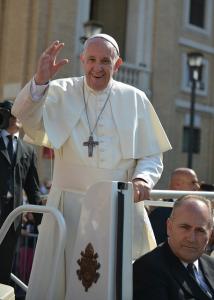We’ve come to the close of Lent. Tonight the Triduum begins with the Maundy Thursday liturgy, after which the Blessed Sacrament is removed from churches and set aside—normally a vigil is kept during the night, though of course this year churches will be without worshipers. Good Friday is always a day of fasting for Catholics; this has been true since the beginning of the Church, as primitive Christians understood the Lord’s statement that “one day the bridegroom will be taken away, and then [my disciples] will fast” to be, among other things, a devotional instruction. The baseline rules as practiced in the West are that only one meal and two snacks are permitted, all of which must be meatless; this is a relaxation of the earlier rule, which did not allow snacks and specified that the meal must be taken after sunset. (These rules are of course dispensed for people whose health does not permit fasting, including young children, the elderly, pregnant and nursing mothers, and the sick.)
I don’t really get fasting, personally. I do it, but, however many times it is explained to me, none of the explanations I’ve heard seem to explain very well. For me, fasting is one of those things where the main recognizable value of doing it (which need not be the same thing as the most important value) is practicing a kind of receptivity to others by preferring the norms of a community to my own whims.
So, I don’t altogether understand why or how fasting is a form of prayer. But I accept that it is, and that fasting for an intention is just as efficacious an act of charity and faith as praying is. It’s in that spirit that I’d like to invite my readers to join me, in addition to fasting for the ordinary reasons tomorrow, in fasting for deliverance from the coronavirus pandemic. This was suggested by higher-ups here at Patheos, who specified these intentions:
- The control of the virus
- The protection of caregivers
- The strengthening of the economy
- The normalization of life
The first two are pretty obvious. If the third intention there seemed a little distasteful at first blush—given our President’s lies and irresponsible rhetoric on the pandemic, and the spate of selfish, dangerous, ill-catechized articles recently published by A Certain Catholic Periodical that focus on little else—well, I felt that way too. If the sabbath was made for man and not man for the sabbath, so much the more so the work week; and if we do not see the Lord’s presence in our neighbor’s body, our veneration of his presence in his own Body is worth little. But, in strict fairness, and when every allowance has been made for the moral and political problems of our economic system: to the extent that the economy suffers, it is primarily people who are already vulnerable that are going to be hurt by it.
And if (also like me) the fourth seems like a frivolous thing to pray for, give it some thought. Even if it is frivolous, God evidently did not consider himself too exalted to create frivolities; the platypus comes to mind. And the truth is, we’re a lot more reliant on things feeling normal than we may like to admit, especially if we think of ourselves as spiritual, intellectual, or artistic. There’s nothing demeaning about having affection for the familiar.












